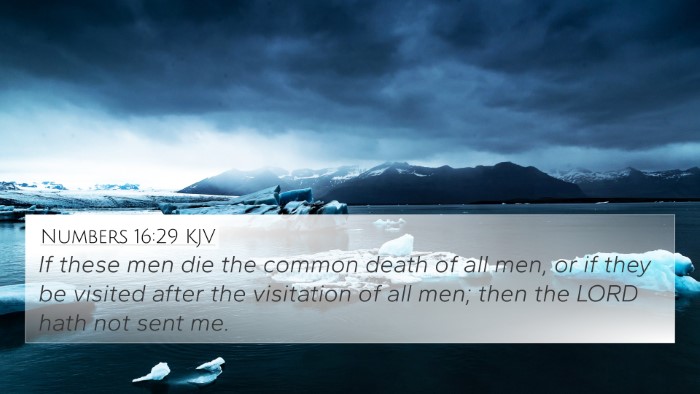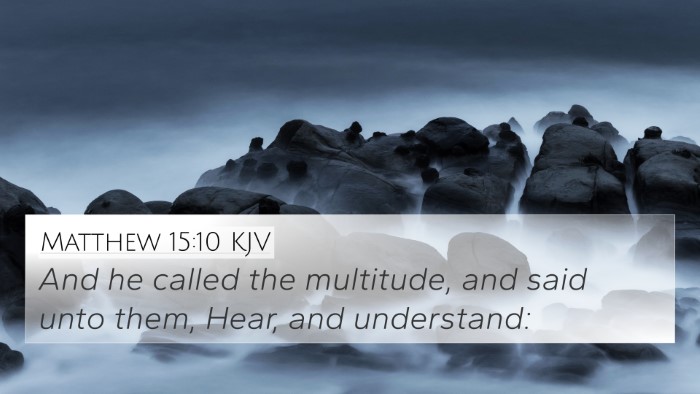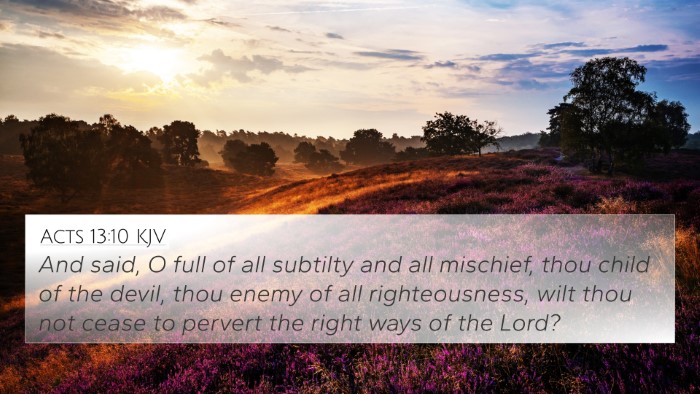Understanding 2 Chronicles 18:27
Bible Verse: 2 Chronicles 18:27
Verse: "And Micaiah said, If thou return at all in peace, the LORD hath not spoken by me. And he said, Hearken, O people, every one of you."
Summary of Meaning
This verse captures a moment of confrontation where the prophet Micaiah asserts his divine authority. The context involves King Ahab of Israel seeking counsel about a military campaign against Ramoth-Gilead, and Micaiah delivers a prophetic message that clearly opposes Ahab’s desires. This statement emphasizes the integrity of true prophecy, highlighting that the words spoken by Micaiah are given by God, and if Ahab returns in peace, it would denote that Micaiah's prophecies were mistaken.
Commentary Insights
-
Matthew Henry's Commentary:
Henry emphasizes the boldness of Micaiah in stating that if Ahab does return safely, it is evidence of his false prophecies. It reflects Micaiah’s role as a faithful messenger, who outright challenges the false prophets and highlights the consequences of ignoring God’s warnings.
-
Albert Barnes' Commentary:
Barnes explains that Micaiah’s declaration was both a warning and a challenge to the people of Israel. He calls upon them to witness the truthfulness of God’s message through this prophecy. His closing statement, “Hearken, O people,” serves to rally the listeners to discern true from false messages.
-
Adam Clarke's Commentary:
Clarke focuses on the significance of God’s voice being rejected by Ahab. He contextualizes Micaiah’s words, underscoring the seriousness of disobedience towards divine instruction. Clarke further explores how prophets often faced grim consequences when their messages were ignored, revealing the risk involved in proclaiming God's truth.
Inter-Biblical Connections
2 Chronicles 18:27 can be cross-referenced with various other passages to uncover deeper meanings and thematic connections:
- 1 Kings 22:28: This parallel passage highlights similar themes where Micaiah predicts disaster for Ahab.
- Jeremiah 23:16: A warning against false prophets, aligning with Micaiah's courage in speaking truth.
- Ezekiel 13:3: Also discusses the consequences of false prophecy, connecting back to Micaiah's admonitions.
- Matthew 7:15-20: The New Testament admonition regarding false prophets echoes the warning Micaiah provides.
- Galatians 1:8: Paul emphasizes the importance of truth in the Gospel, a theme Micaiah embodies by rejecting falsehood.
- Romans 12:2: This verse speaks to the necessity of discerning God’s will, connected to Micaiah’s prophetic role.
- Revelation 22:18-19: A warning about adding to the prophetic word, similar to how Micaiah warns Ahab against ignoring God’s truth.
- Deuteronomy 18:20: Outlines the punishment for false prophets, drawing a line to the integrity of Micaiah's declaration.
Thematic Connections
The verse discusses several key themes prevalent throughout the Bible:
- The Authority of Prophecy: This verse serves as a reminder of God’s authority in speaking through prophets.
- The Consequences of Ignoring God: Ahab’s fate serves as an example of the repercussions of disobedience.
- Faithfulness in Prophetic Ministry: Micaiah exemplifies integrity and courage in delivering God’s message.
- Communal Responsibility: Micaiah calls the people to listen, reflecting the duty of the community to heed God’s words.
Cross-Referencing Tools
Utilizing cross-references can enhance understanding of this verse. Here are some tools and methods:
-
Bible Concordance: A helpful resource for finding verses that relate to specific terms or themes.
-
Cross-Reference Bible Study: Methods for linking verses and themes across the scriptures.
-
Comprehensive Bible Cross-Reference Materials: Useful guides that provide extensive cross-referencing for deeper exploration.
Conclusion
In conclusion, 2 Chronicles 18:27 not only serves as a pivotal moment in the narrative of Micaiah and Ahab but also provides profound insights into the nature of true prophecy and the need for accountability among God's people. By exploring related verses, themes, and employing cross-referencing tools, one can gain a more robust understanding of this scripture and its implications for faith and practice.










